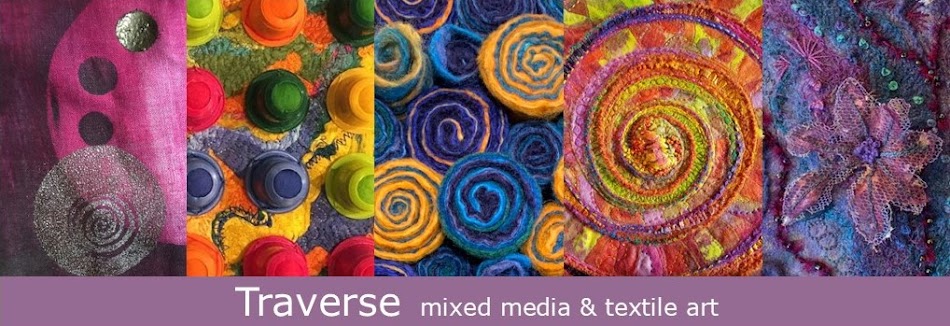Looking at something –
anything – is more interesting than doing anything else, ever…
Patrick
Heron
I wasn’t sure about this quote when I first read it last week at Tate St Ives – my love
of music means listening is also very interesting for me – but, in relation to
my textile art, many of Patrick Heron's words aptly describe my own impetus and
inspiration. His approach to painting came from direct visual responses to the
world and his belief that all painting is abstract to some extent also resonates
with my own inclinations. I love the way he manipulated flatness, space, colour
and line when depicting what he saw when ‘looking at something’.
(N.B. - all images are my own photographs from the exhibition, as photography was allowed. However, some are not quite straight due to external factors. All italics are Patrick Heron's words)
Window for Tate Gallery St Ives : 1992-93 – one of the
largest unleaded coloured glass windows in the world
The picture is not the
vehicle of meaning: the picture is the meaning …
For someone who struggles sometimes with the concept-based
approach to art, trying desperately to decide what my work ‘means’ (if anything)
I loved this quote. I could really relate to his belief that the impact of the
work on the viewer does not depend on it describing the world outside and that
any meaning comes from the balance between the different forms, shapes, light
and colour within it.
And what colour there was - everywhere - I revelled in it!
… the reason why the
stripes sufficed as the formal vehicle of the colour, was precisely that they
were so very uncomplicated as shapes … With stripes one was free to deal only
with the interaction between varying quantities of varied colours…
Green and Mauve Horizontals : 1958
The organisation of the exhibition highlighted several recurring features of composition in Patrick Heron's work. I found the following few most interesting:
Each colour-shape or area, however large or small, is as
important as any other.
Orange and Lemon with Small Violet : 1977
Balance is often created by bunching forms along an edge and by the inter-relation of different sized shapes.
Square Green with Orange, Violet and Lemon :
1969
I was fascinated by the significance given to the edges in a painting and the way he
managed to achieve a sense of balance through asymmetry.
Dark Purple and Ceruleum : 1965
Painting should
resolve asymmetric, unequal, disparate formal ingredients into a state of
architectonic harmony which, while remaining asymmetrical, nevertheless
constitutes a perfect state of balance or equilibrium …
Big Complex Diagonal with Emerald and Reds : March 1972 - September 1974
I noticed that the painting above took him over two years to
complete and then was amazed to read this quote beside the following huge,
glorious canvas and I understood why …
My fifteen-foot
canvases, involving sixty or more square feet of a single colour, were painted
(in oil paint) from end to end with small Japanese water-colour brushes. But
one doesn’t hand-paint for the sake of the ‘hand-done’; one merely knows that
the surfaces worked in this way can – in fact they must – register a different
nuance of spatial evocation and movement in every single square millimetre.
Cadmium with Violet. Scarlet, Emerald, Lemon and Venetian : 1969
Patrick Heron's work is much more varied than it appears here but I’ve concentrated particularly on these large colour
canvases as they are the works which speak with the most power to me - colour is certainly the most significant feature for me in my own work. However, the various composition
features identified above also gave me much thought – and continue to do so now we’ve
returned home and I begin to think of my own work again.
I did find myself looking a little more carefully as we
wandered around St Ives later – specifically at rust in all its glory. I needed some
photos as inspiration for a workshop later this year – more on that later.
Watch this space and keep looking ...
Cath

















